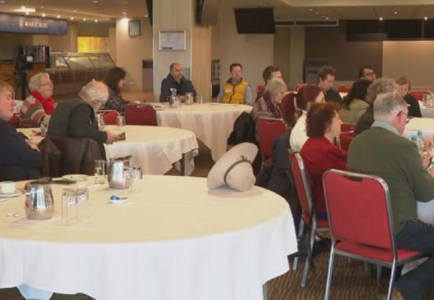Emergency services levy hike threatens household budgets across country
By
Gian T
- Replies 0
If you’ve been feeling the pinch at the checkout or dreading the arrival of your next rates notice, you’re not alone.
A new emergency services levy introduced by the government has sparked outrage with local councils banding together in an unprecedented legal challenge to block the tax.
For many, this could mean yet another hit to the household budget, at a time when every dollar counts.
Mayors from all corners of Victoria converged in Melbourne this week, opposing the state government’s plan.
The new levy, which aims to raise billions for emergency services, is being handed to local councils to collect, effectively making them the government’s tax collectors.
Geelong, for example, is being asked to raise an extra $20 million from its residents. Gippsland’s Latrobe council faces a $5 million target.
Even inner-city councils like the City of Yarra are being tasked with collecting hundreds of thousands more.
The mayors say this is a responsibility they neither want nor believe is fair.
'We’re essentially the debt collectors for Spring Street,' said City of Yarra Mayor Stephen Jolly, referring to the state government’s headquarters.
'We want to stop this in any way we can. We can’t do it on our own, we have to do it collectively.'
The main worry is the impact on everyday Victorians, especially those struggling to make ends meet.
Deputy Mayor Sharon Gibson of Latrobe painted a stark picture: 'People can’t afford to put food on the table.
They’re debating whether to send their kids to school hungry or pay the bills.'
Councils are also concerned about the administrative burden. They’re being forced to overhaul how they collect rates, introduce new payment schedules, and update financial hardship policies—all while bracing for a wave of anger from residents.
And if people can’t pay? Councils could be forced to chase up debts or risk having their funds seized by the state.
'The state government will obligate councils to follow up, but we’re looking at measures on how we cannot do that and what our legal obligations are,' said Geelong councillor Trent Sullivan.
If you’re a Victorian ratepayer, you could soon see a new line item on your rates notice that could add hundreds of dollars to your annual bill.
The timing couldn’t be worse. With the cost of living already sky-high and many older Australians relying on pensions or superannuation, every extra expense stings.
The emergency services levy isn’t new in concept—similar levies exist in other states, designed to fund vital services like fire, ambulance, and SES. But the way it’s being implemented in Victoria has drawn criticism for shifting the burden onto local councils and, by extension, ratepayers.
Traditionally, emergency services have been funded through a mix of state taxes and insurance levies.
Critics say the new approach is less transparent and more likely to affect those who can least afford it.
Councils are exploring their legal options, hoping to avoid being forced into the role of tax collector.
Some have already started issuing new rate notices, but they’re warning residents that they’re fighting the changes behind the scenes.
No ministers from the Allan Government were available to comment on the councils’ legal move, leaving many questions unanswered.

Are you worried about the new emergency services levy? Have you already seen changes to your rates notice, or are you concerned about how you’ll manage the extra cost? We want to hear from you! Share your thoughts and experiences in the comments below.
Read more: Suspended Townsville mayor Troy Thompson gets pay rise despite CCC probe
A new emergency services levy introduced by the government has sparked outrage with local councils banding together in an unprecedented legal challenge to block the tax.
For many, this could mean yet another hit to the household budget, at a time when every dollar counts.
Mayors from all corners of Victoria converged in Melbourne this week, opposing the state government’s plan.
The new levy, which aims to raise billions for emergency services, is being handed to local councils to collect, effectively making them the government’s tax collectors.
Geelong, for example, is being asked to raise an extra $20 million from its residents. Gippsland’s Latrobe council faces a $5 million target.
Even inner-city councils like the City of Yarra are being tasked with collecting hundreds of thousands more.
The mayors say this is a responsibility they neither want nor believe is fair.
'We’re essentially the debt collectors for Spring Street,' said City of Yarra Mayor Stephen Jolly, referring to the state government’s headquarters.
'We want to stop this in any way we can. We can’t do it on our own, we have to do it collectively.'
The main worry is the impact on everyday Victorians, especially those struggling to make ends meet.
Deputy Mayor Sharon Gibson of Latrobe painted a stark picture: 'People can’t afford to put food on the table.
They’re debating whether to send their kids to school hungry or pay the bills.'
Councils are also concerned about the administrative burden. They’re being forced to overhaul how they collect rates, introduce new payment schedules, and update financial hardship policies—all while bracing for a wave of anger from residents.
And if people can’t pay? Councils could be forced to chase up debts or risk having their funds seized by the state.
'The state government will obligate councils to follow up, but we’re looking at measures on how we cannot do that and what our legal obligations are,' said Geelong councillor Trent Sullivan.
The timing couldn’t be worse. With the cost of living already sky-high and many older Australians relying on pensions or superannuation, every extra expense stings.
The emergency services levy isn’t new in concept—similar levies exist in other states, designed to fund vital services like fire, ambulance, and SES. But the way it’s being implemented in Victoria has drawn criticism for shifting the burden onto local councils and, by extension, ratepayers.
Traditionally, emergency services have been funded through a mix of state taxes and insurance levies.
Critics say the new approach is less transparent and more likely to affect those who can least afford it.
Some have already started issuing new rate notices, but they’re warning residents that they’re fighting the changes behind the scenes.
No ministers from the Allan Government were available to comment on the councils’ legal move, leaving many questions unanswered.
Key Takeaways
- Victorian councils are uniting to launch legal action against the Allan Government’s new emergency services levy, arguing it will push ratepayers to financial hardship.
- Councils such as Geelong, Gippsland, and Latrobe say they’re being forced to collect millions in extra taxes, which they believe will make it even harder for struggling residents to afford basic needs like food.
- Local government leaders, including mayors from across the state, have described themselves as 'debt collectors for Spring Street' and are seeking ways to avoid enforcing the levy.
- The state government has not yet responded to the councils’ legal action, with no Allan government ministers available for comment.
Read more: Suspended Townsville mayor Troy Thompson gets pay rise despite CCC probe
Last edited:








